O Ye Tongues by Anne Sexton

First Psalm
Let there be a God as large as a sunlamp to laugh his heat at you.
Let there be an earth with a form like a jigsaw and let it fit for all of ye.
Let there be the darkness of a darkroom out of the deep. A worm room.
Let there be a God who sees light at the end of a long thin pipe and lets it in.
Let God divide them in half.
Let God share his Hoodsie.
Let the waters divide so that God may wash his face in first light.
Read Poem Let there be a God as large as a sunlamp to laugh his heat at you.
Let there be an earth with a form like a jigsaw and let it fit for all of ye.
Let there be the darkness of a darkroom out of the deep. A worm room.
Let there be a God who sees light at the end of a long thin pipe and lets it in.
Let God divide them in half.
Let God share his Hoodsie.
Let the waters divide so that God may wash his face in first light.
0
from Each in a Place Apart by James McMichael

I know I’ll lose her.
One of us will decide. Linda will say she can’t
do this anymore or I’ll say I can’t. Confused
only about how long to stay, we’ll meet and close it up.
She won’t let me hold her. I won’t care that my
eyes still work, that I can lift myself past staring.
Nothing from her will reach me after that.
I’ll drive back to them, their low white T-shaped house
Read Poem One of us will decide. Linda will say she can’t
do this anymore or I’ll say I can’t. Confused
only about how long to stay, we’ll meet and close it up.
She won’t let me hold her. I won’t care that my
eyes still work, that I can lift myself past staring.
Nothing from her will reach me after that.
I’ll drive back to them, their low white T-shaped house
0
Étude Réaliste by Algernon Charles Swinburne

(excerpt) I
A baby's feet, like sea-shells pink,
Might tempt, should heaven see meet,
An angel's lips to kiss, we think,
Read Poem A baby's feet, like sea-shells pink,
Might tempt, should heaven see meet,
An angel's lips to kiss, we think,
0
Love Song No. 3 by Sonia Sanchez

1.
i'm crazy bout that chile but she gotta go.
she don't pay me no mind no mo. guess her
mama was right to put her out cuz she
couldn't do nothin wid her. but she been
mine so long. she been my heart so long
now she breakin it wid her bad habits.
always runnin like a machine out of control;
Read Poem i'm crazy bout that chile but she gotta go.
she don't pay me no mind no mo. guess her
mama was right to put her out cuz she
couldn't do nothin wid her. but she been
mine so long. she been my heart so long
now she breakin it wid her bad habits.
always runnin like a machine out of control;
0
Something in the Belly by Deena Metzger
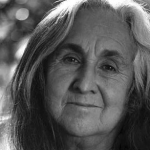
I wanted to have a poem and I was pregnant. I was very thin. As if I’d lived on air. A poet must be able to live on air, but a mother must not attempt it. My mother wanted me to buy a set of matching pots, Wearever aluminum, like the ones she had. They were heavy and had well fitting lids so my suppers wouldn’t burn. My husband wanted me to give dinner parties. John F. Kennedy was running for office.
I sensed danger. Kennedy wasn’t against the Bomb or for nuclear disarmament. I joined SANE at its inception. Also Concerned Scientists. I spoke with Linus Pauling and encouraged my husband to help his partner organize Physicians for Social Responsibility.
There was a baby in my belly. I wanted to write poems. I had a crazy idea that a woman could write a real novel, the kind that shook the world. I hallucinated that a woman could be a poet, but she would have to be free. I couldn’t imagine that freedom for myself even though I could see it in Isla Negra when I followed Pablo Neruda. I could see it in the way he walked. Even if he were walking inside a dictatorship, among guns, soldiers and spies, there was nothing between him and his vision. Anything he saw, he was able to take into himself–there was no sight, no image, no vision to which he didn’t feel entitled. In his heart, everything–everything–belonged to him. Pablo Neruda was–more than anything–a poet, and so he was an entitled man.
I was a woman and entitled to nothing. I had nothing except a husband, a rented house, a set of pots, living room furniture, a frenzy of obligations, credit cards, anxious relatives, too many acquaintances, a gift of future diaper service, two telephones, no time to read, a plastic wrapped cookbook of recipes gleaned from the pages of the New York Times, and a hunger, a terrible hunger for the unimaginable, unlimited freedom of being a poet, and a baby in my belly.
I would have called Pablo long distance if I had the courage, if I had the ability to speak Spanish fluently, if we had ever talked about real things. But, what would a man know about a baby in the belly? And what did it matter if there were to be one poet more or less in the world when so many in his country were dying?
I woke up one morning and thought–I can’t have this child. My husband said, “You’ll have to get a job after it’s born so we can buy a house. You’ll need an advanced degree so you can do something.” I thought, I can’t. I have to write poems. My mother found a crib. Someone painted it white. A friend sent a pastel mobile with tame wood animals. I thought about blue curtains, making bedspreads, and abortions.
Pablo was silent. He was walking so far from me, I couldn’t hear him. My husband objected to donating more free medical care to the Black Panthers. I tried to make dolmades from scratch and located grape leaves preserved in brine at the Boys’ Market twenty miles away. I organized a write-in campaign for peace to challenge JFK. My husband thought it would be nice to have teatime with the children and romantic dinners by ourselves. The new formula bottles lined up on the sink like tiny bombs. The U.S. was pursuing over ground testing; I was afraid the radiation would cross the milk barrier. I had a poem in me howling for real life but no language to write in. The fog came in thick, flapping about my feet like blankets unraveling. I became afraid to have a daughter.
I called Pablo Neruda in the middle of the night as he walked underwater by Isla Negra. He moved like a dream porpoise. He seemed pregnant with words. They came out of his penis in long miraculous strings. The sea creatures quivered with joy. I said, “Pablo, I want to know how to bear the child in my belly onto this bed of uranium and I want to know if a woman can a be a poet.” He was large as a whale. He drank the sea and spouted it in glistening odes, black and shiny. I said, “I can’t have this child,” and he laughed as if he had never done anything but carry and birth children.
Read Poem I sensed danger. Kennedy wasn’t against the Bomb or for nuclear disarmament. I joined SANE at its inception. Also Concerned Scientists. I spoke with Linus Pauling and encouraged my husband to help his partner organize Physicians for Social Responsibility.
There was a baby in my belly. I wanted to write poems. I had a crazy idea that a woman could write a real novel, the kind that shook the world. I hallucinated that a woman could be a poet, but she would have to be free. I couldn’t imagine that freedom for myself even though I could see it in Isla Negra when I followed Pablo Neruda. I could see it in the way he walked. Even if he were walking inside a dictatorship, among guns, soldiers and spies, there was nothing between him and his vision. Anything he saw, he was able to take into himself–there was no sight, no image, no vision to which he didn’t feel entitled. In his heart, everything–everything–belonged to him. Pablo Neruda was–more than anything–a poet, and so he was an entitled man.
I was a woman and entitled to nothing. I had nothing except a husband, a rented house, a set of pots, living room furniture, a frenzy of obligations, credit cards, anxious relatives, too many acquaintances, a gift of future diaper service, two telephones, no time to read, a plastic wrapped cookbook of recipes gleaned from the pages of the New York Times, and a hunger, a terrible hunger for the unimaginable, unlimited freedom of being a poet, and a baby in my belly.
I would have called Pablo long distance if I had the courage, if I had the ability to speak Spanish fluently, if we had ever talked about real things. But, what would a man know about a baby in the belly? And what did it matter if there were to be one poet more or less in the world when so many in his country were dying?
I woke up one morning and thought–I can’t have this child. My husband said, “You’ll have to get a job after it’s born so we can buy a house. You’ll need an advanced degree so you can do something.” I thought, I can’t. I have to write poems. My mother found a crib. Someone painted it white. A friend sent a pastel mobile with tame wood animals. I thought about blue curtains, making bedspreads, and abortions.
Pablo was silent. He was walking so far from me, I couldn’t hear him. My husband objected to donating more free medical care to the Black Panthers. I tried to make dolmades from scratch and located grape leaves preserved in brine at the Boys’ Market twenty miles away. I organized a write-in campaign for peace to challenge JFK. My husband thought it would be nice to have teatime with the children and romantic dinners by ourselves. The new formula bottles lined up on the sink like tiny bombs. The U.S. was pursuing over ground testing; I was afraid the radiation would cross the milk barrier. I had a poem in me howling for real life but no language to write in. The fog came in thick, flapping about my feet like blankets unraveling. I became afraid to have a daughter.
I called Pablo Neruda in the middle of the night as he walked underwater by Isla Negra. He moved like a dream porpoise. He seemed pregnant with words. They came out of his penis in long miraculous strings. The sea creatures quivered with joy. I said, “Pablo, I want to know how to bear the child in my belly onto this bed of uranium and I want to know if a woman can a be a poet.” He was large as a whale. He drank the sea and spouted it in glistening odes, black and shiny. I said, “I can’t have this child,” and he laughed as if he had never done anything but carry and birth children.
0
The house was just twinkling in the moon light by Gertrude Stein

Highlight Actions Enable or disable annotations
Read Poem 0
The Little White Hearse by Ella Wheeler Wilcox

Somebody’s baby was buried to-day—
The empty white hearse from the grave rumbled back,
And the morning somehow seemed less smiling and gay
As I paused on the walk while it crossed on its way,
And a shadow seemed drawn o’er the sun’s golden track.
Somebody’s baby was laid out to rest,
White as a snowdrop, and fair to behold,
And the soft little hands were crossed over the breast,
And those hands and the lips and the eyelids were pressed
With kisses as hot as the eyelids were cold.
Somebody saw it go out of her sight,
Under the coffin lid—out through the door;
Somebody finds only darkness and blight
Read Poem The empty white hearse from the grave rumbled back,
And the morning somehow seemed less smiling and gay
As I paused on the walk while it crossed on its way,
And a shadow seemed drawn o’er the sun’s golden track.
Somebody’s baby was laid out to rest,
White as a snowdrop, and fair to behold,
And the soft little hands were crossed over the breast,
And those hands and the lips and the eyelids were pressed
With kisses as hot as the eyelids were cold.
Somebody saw it go out of her sight,
Under the coffin lid—out through the door;
Somebody finds only darkness and blight
0
The Thorn by William Wordsworth

I
“There is a Thorn—it looks so old,
In truth, you’d find it hard to say
How it could ever have been young,
It looks so old and grey.
Not higher than a two years' child
It stands erect, this aged Thorn;
No leaves it has, no prickly points;
It is a mass of knotted joints,
A wretched thing forlorn.
It stands erect, and like a stone
With lichens is it overgrown.
II
“Like rock or stone, it is o’ergrown,
Read Poem “There is a Thorn—it looks so old,
In truth, you’d find it hard to say
How it could ever have been young,
It looks so old and grey.
Not higher than a two years' child
It stands erect, this aged Thorn;
No leaves it has, no prickly points;
It is a mass of knotted joints,
A wretched thing forlorn.
It stands erect, and like a stone
With lichens is it overgrown.
II
“Like rock or stone, it is o’ergrown,
0
Ballad of Birmingham by Dudley Randall
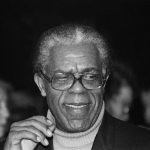
(On the bombing of a church in Birmingham, Alabama, 1963) “Mother dear, may I go downtown
Instead of out to play,
Read Poem Instead of out to play,
0
The Baby's Dance by Ann Taylor
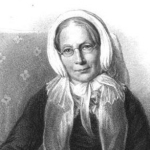
DANCE little baby, dance up high,
Never mind baby, mother is by ;
Crow and caper, caper and crow,
There little baby, there you go ;
Up to the ceiling, down to the ground,
Backwards and forwards, round and round ;
Dance little baby, and mother shall sing,
With the merry coral, ding, ding, ding.
0
The Life of Lincoln West by Gwendolyn Brooks

Ugliest little boy
that everyone ever saw.
That is what everyone said.
Even to his mother it was apparent—
when the blue-aproned nurse came into the
northeast end of the maternity ward
bearing his squeals and plump bottom
looped up in a scant receiving blanket,
Read Poem that everyone ever saw.
That is what everyone said.
Even to his mother it was apparent—
when the blue-aproned nurse came into the
northeast end of the maternity ward
bearing his squeals and plump bottom
looped up in a scant receiving blanket,
0
Oakland Blues by Ishmael Reed
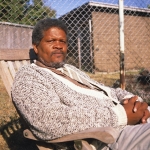
Well it's six o'clock in Oakland
and the sun is full of wine
I say, it's six o'clock in Oakland
and the sun is red with wine
We buried you this morning, baby
in the shadow of a vine
Well, they told you of the sickness
almost eighteen months ago
Read Poem and the sun is full of wine
I say, it's six o'clock in Oakland
and the sun is red with wine
We buried you this morning, baby
in the shadow of a vine
Well, they told you of the sickness
almost eighteen months ago
0
Kaddish by Allen Ginsberg

For Naomi Ginsberg, 1894—1956 I
Strange now to think of you, gone without corsets & eyes, while I walk on the sunny pavement of Greenwich Village.
Read Poem Strange now to think of you, gone without corsets & eyes, while I walk on the sunny pavement of Greenwich Village.
0
Little Brown Baby by Paul Laurence Dunbar
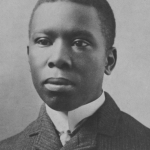
Little brown baby wif spa'klin' eyes,
Come to yo' pappy an' set on his knee.
What you been doin', suh — makin' san' pies?
Look at dat bib — you's es du'ty ez me.
Look at dat mouf — dat's merlasses, I bet;
Come hyeah, Maria, an' wipe off his han's.
Bees gwine to ketch you an' eat you up yit,
Bein' so sticky an sweet — goodness lan's!
Read Poem Come to yo' pappy an' set on his knee.
What you been doin', suh — makin' san' pies?
Look at dat bib — you's es du'ty ez me.
Look at dat mouf — dat's merlasses, I bet;
Come hyeah, Maria, an' wipe off his han's.
Bees gwine to ketch you an' eat you up yit,
Bein' so sticky an sweet — goodness lan's!
0
Morning After by Langston Hughes
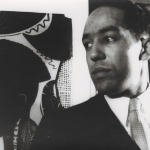
I was so sick last night I
Didn’t hardly know my mind.
So sick last night I
Didn’t know my mind.
I drunk some bad licker that
Almost made me blind.
Had a dream last night I
Thought I was in hell.
Read Poem Didn’t hardly know my mind.
So sick last night I
Didn’t know my mind.
I drunk some bad licker that
Almost made me blind.
Had a dream last night I
Thought I was in hell.
0
Jail Poems by Bob Kaufman
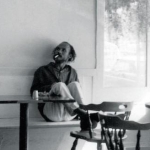
1
I am sitting in a cell with a view of evil parallels,
Waiting thunder to splinter me into a thousand me's.
It is not enough to be in one cage with one self;
I want to sit opposite every prisoner in every hole.
Doors roll and bang, every slam a finality, bang!
The junkie disappeared into a red noise, stoning out his hell.
The odored wino congratulates himself on not smoking,
Read Poem I am sitting in a cell with a view of evil parallels,
Waiting thunder to splinter me into a thousand me's.
It is not enough to be in one cage with one self;
I want to sit opposite every prisoner in every hole.
Doors roll and bang, every slam a finality, bang!
The junkie disappeared into a red noise, stoning out his hell.
The odored wino congratulates himself on not smoking,
1
Little Albert, 1920 by Joyce Carol Oates
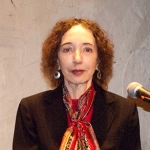
I was Little Albert.
Nine months old in the famous film.
In a white cotton nightie, on a lab
table sitting upright
facing a camera.
Remember me? Sure.
You do.
First, you saw that I was a “curious” baby.
Read Poem Nine months old in the famous film.
In a white cotton nightie, on a lab
table sitting upright
facing a camera.
Remember me? Sure.
You do.
First, you saw that I was a “curious” baby.
0
Staggerlee wonders by James Baldwin
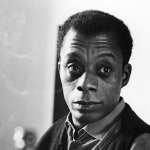
1
I always wonder
what they think the niggers are doing
while they, the pink and alabaster pragmatists,
are containing
Russia
and defining and re-defining and re-aligning
China,
Read Poem I always wonder
what they think the niggers are doing
while they, the pink and alabaster pragmatists,
are containing
Russia
and defining and re-defining and re-aligning
China,
0
Belongings by Sandra M. Gilbert
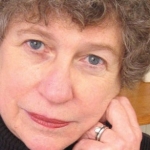
—in memory of Angela Marie Incoronata Caruso Mortola,
May 21, 1903–January 14, 2001 1
In-and-out sunlike the light of her mindthat knows
Read Poem May 21, 1903–January 14, 2001 1
In-and-out sunlike the light of her mindthat knows
0
“The Dreadful Has Already Happened” by Mark Strand

The relatives are leaning over, staring expectantly.
They moisten their lips with their tongues. I can feel
them urging me on. I hold the baby in the air.
Heaps of broken bottles glitter in the sun.
A small band is playing old fashioned marches.
My mother is keeping time by stamping her foot.
My father is kissing a woman who keeps waving
to somebody else. There are palm trees.
Read Poem They moisten their lips with their tongues. I can feel
them urging me on. I hold the baby in the air.
Heaps of broken bottles glitter in the sun.
A small band is playing old fashioned marches.
My mother is keeping time by stamping her foot.
My father is kissing a woman who keeps waving
to somebody else. There are palm trees.
0